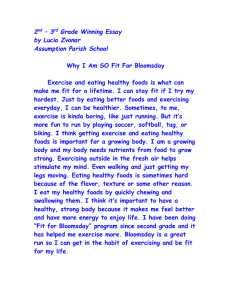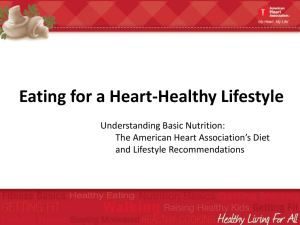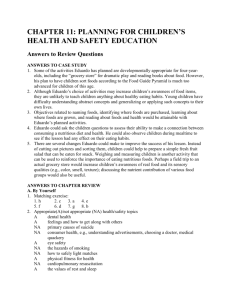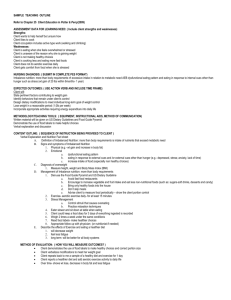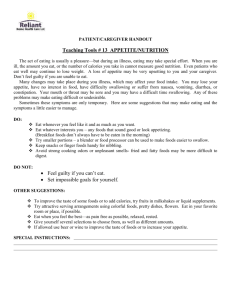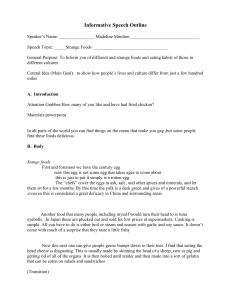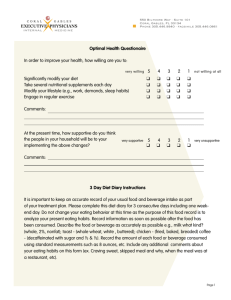Healthy Eating/Living Policy - Abbey Meads Community Primary
advertisement
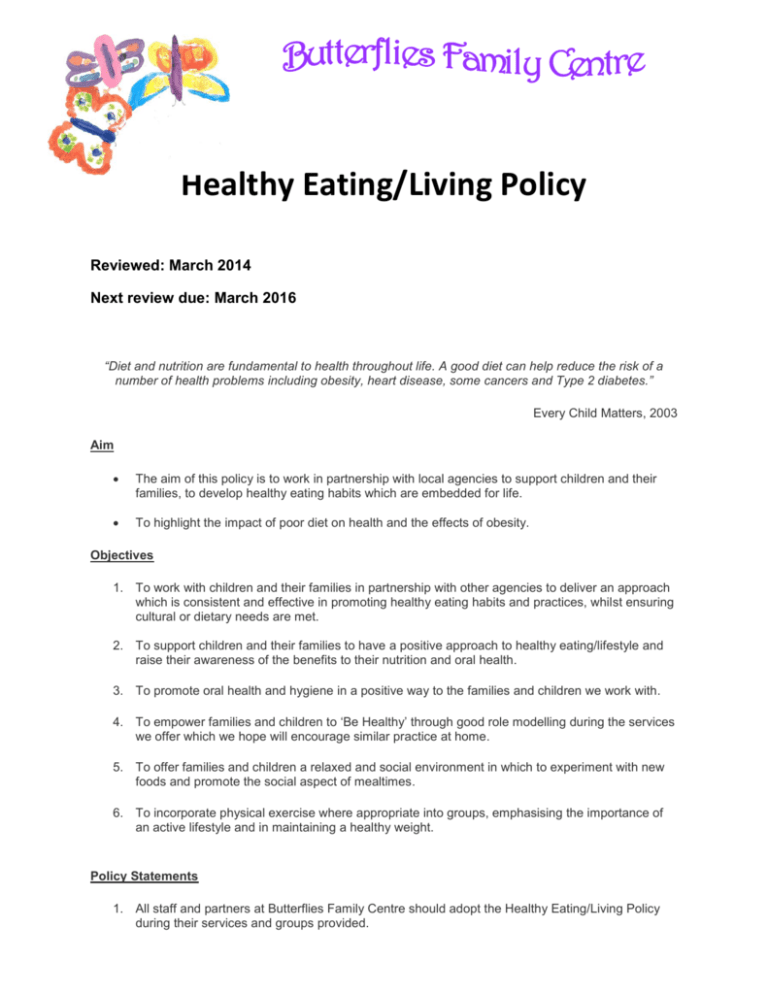
Healthy Eating/Living Policy Reviewed: March 2014 Next review due: March 2016 “Diet and nutrition are fundamental to health throughout life. A good diet can help reduce the risk of a number of health problems including obesity, heart disease, some cancers and Type 2 diabetes.” Every Child Matters, 2003 Aim The aim of this policy is to work in partnership with local agencies to support children and their families, to develop healthy eating habits which are embedded for life. To highlight the impact of poor diet on health and the effects of obesity. Objectives 1. To work with children and their families in partnership with other agencies to deliver an approach which is consistent and effective in promoting healthy eating habits and practices, whilst ensuring cultural or dietary needs are met. 2. To support children and their families to have a positive approach to healthy eating/lifestyle and raise their awareness of the benefits to their nutrition and oral health. 3. To promote oral health and hygiene in a positive way to the families and children we work with. 4. To empower families and children to ‘Be Healthy’ through good role modelling during the services we offer which we hope will encourage similar practice at home. 5. To offer families and children a relaxed and social environment in which to experiment with new foods and promote the social aspect of mealtimes. 6. To incorporate physical exercise where appropriate into groups, emphasising the importance of an active lifestyle and in maintaining a healthy weight. Policy Statements 1. All staff and partners at Butterflies Family Centre should adopt the Healthy Eating/Living Policy during their services and groups provided. 2. All staff and partners at Butterflies Family Centre should follow the Healthy Eating/ Living Policy when providing snacks and drinks. 3. The policy should also be followed when cooking with groups and encouraged at our volunteer run groups. 4. All groups and services should offer access to fresh drinking water throughout the day. 5. Staff and group leaders should access training to enable them to increase their skills for promoting Healthy Eating. Each group/service (wherever possible) when food is prepared should have a leader or member of staff trained in Food Hygiene. 6. Healthy Eating should be promoted throughout the services we offer and in a variety of ways including the foods we offer, activities we provide and the literature we display. Visitors including: Dental Hygiene, Speech and Language Therapists and Health Visitors, will be invited to support us in our aims and share their expertise. 7. Staff and groups/service leaders should promote meal and snack time as a positive and social interaction time where skills and habits can be promoted with role modelling and a positive approach to food. 8. Cultural, tradition and diverse aspects of Healthy Eating should be promoted. 9. Children and families should be offered a wide and diverse range of foods which reflect the breadth of the culture and diverse nature of the world community. 10. Staff and group leaders should take into account cultural, medical and religious needs of families and children and plan for these where appropriate 11. Parents/carers should be encouraged to share any cultural, religious or medical needs they or their children may have in relation to food and drink 12. Children should be encouraged to try new food but never forced. Children who refuse any type of food should not be excluded from having other foods on offer if they refuse something. 13. Sweets, cake, crisps and other similarly high sugar/fat/salt foods and drink should not be offered as routine but can be offered in moderation at special occasions such as celebrations or birthdays, where the importance of a balanced diet can be conveyed. 14. Staff and group leaders should support families and children at all times to promote healthy eating practices and habits. Further support should be sought where necessary for other agencies. 15. Staff or third party specialists should provide physical activities and encourage exercises at a variety of groups. Other agencies: Staff have undergone a variety of training and an offer support and information on encouraging children to eat healthily and enjoy mealtimes. The can also provide information on weaning and suitable foods for children, balanced diets, reducing obesity and suitable exercises for early years. Health Visitors can offer nutritional advice around what foods to give children, some health advice and they can also weigh children at Child Health Clinics. Your Health Visitor can also refer to other agencies or help get a GP appointment for a child if needed. Speech therapists can offer advice on how eating habits and practices can affect oral health and speech. Dental Health can offer support and advice about the nutritional contents of food and how foods can affect oral health. Dieticians can offer more in depth advice about food and nutrition and promoting health through eating. They can help modify diets to improve health. Trainers can offer courses to educate parents and carers to be able to make healthy foods at low cost, to suggest exercises and offer advice in healthy eating and lifestyle choices.


